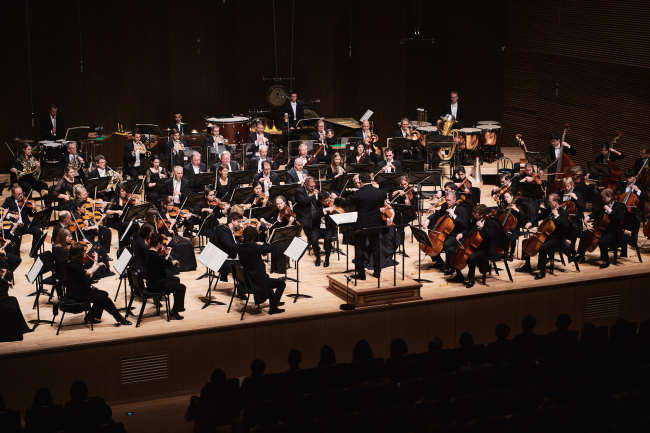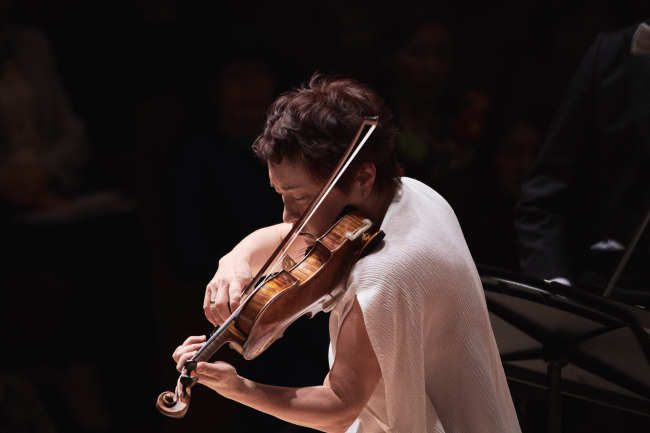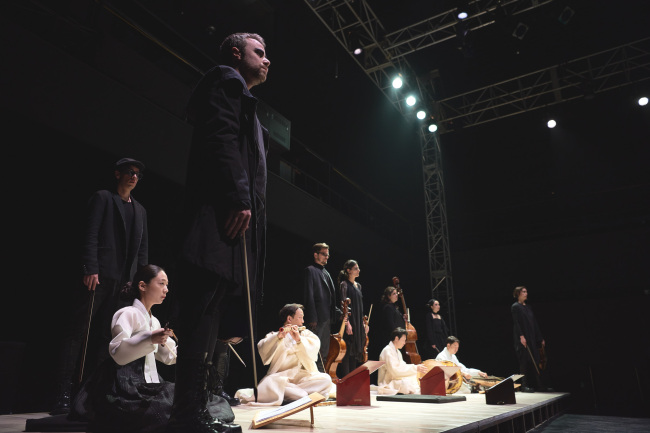Legacy of Yun I-sang celebrated at Tongyeong fest
World premiere of ‘Returning Home’ marks return of late composer to hometown
By Shim Woo-hyunPublished : April 2, 2018 - 15:59
TONGYEONG, South Gyeongsang Province -- The Tongyeong International Music Festival 2018 began Friday, marking the return of the late composer Yun I-sang to his hometown.
Conductor Steven Sloane led the Bochum Symphony Orchestra in its first-ever performance of Yun I-sang’s “Exemplum in Memoriam Gwangju,” an homage to the Gwangju Uprising composed in 1981 while Yun was living in Berlin.
“I watched him giving vent to his frustration and sorrow. He often burst into tears while he was composing the piece,” said Yun’s wife Lee Su-ja during a memorial ceremony held earlier in the day.
Conductor Steven Sloane led the Bochum Symphony Orchestra in its first-ever performance of Yun I-sang’s “Exemplum in Memoriam Gwangju,” an homage to the Gwangju Uprising composed in 1981 while Yun was living in Berlin.
“I watched him giving vent to his frustration and sorrow. He often burst into tears while he was composing the piece,” said Yun’s wife Lee Su-ja during a memorial ceremony held earlier in the day.

“Exemplum in Memoriam Gwangju” is an embodiment of the torment and grief that the composer must have suffered in a distant land, where he felt helpless. The dramaturgy of the work not only represents the pro-democracy uprising but is also a confession of a person who is unable to return to his beloved homeland.
“Beyond this historical event, which can be understood as ‘an example,’ a universal example, the work wants to be a memorial in mourning for the victims and a reminder of the fight for freedom in the world,” composer Yun once said about his work.
Accompanied by the traditional percussion instrument “bak” -- used to represent the sound of gunshots in the shooting scene -- the Bochum Orchestra relayed the historical event and the composer’s emotions to the audience.
The contemporary composition, which is also quite notorious for being difficult to perform, perhaps sounded unfamiliar to the audience at Tongyeong, whose response to the piece was not overly enthusiastic.
Violinist Chung Kyung-wha, on the other hand, enthralled the audience with her performance of one of her favorite pieces, Brahms’ Violin Concerto in D Major Op. 77 with the Bochum Symphony Orchestra.

The crowd responded enthusiastically to the performance by the country’s favorite and best-known violinist who recently celebrated her 70th birthday. Chung responded with an encore performance -- Bach’s Andante from Sonata A minor.
The world premiere of “Returning Home,” a music theater work by stage director Ludger Engels, which began at 10 p.m. at Black Box, was another highlight of the evening. Based on Monteverdi’s opera “The Return of Ulysses,” it offered the audience opportunities to think about the meaning of home, while drawing parallels between Ulysses and composer Yun, who finally returned home 23 years after his death.
To pose the centuries-old question, Engels exercised his artistic license to alter parts of the narrative and insert “Gagok.”
Gagok is Korean traditional vocal music, often accompanied by a small ensemble of traditional instruments. It was developed around the same time when Baroque music started to take shape in the West.

Tied together under the theme of departure and return, Monteverdi’s original melodies, Baroque sounds and Gagok provided an unusual and intriguing combination of music. As vastly different as they are, Monteverdi’s music and Gagok songs follow each other, with the Italian opera singing rendering the narrative and emotions of characters, while Gagok singing offered the audience a philosophical commentary on the narrative.
“It was a very great adventure to combine the two (Monteverdi’s opera and gagok),” said director Engels. They are two opposite kinds of music performed in two distant areas, one in the West and the other in the East, but they come together very well, Engels also noted.
Like his previous work “Semele Walk,” Engels again employed contemporary props, making the work based on the 17th century opera look new.
Baritone Lee Eung-kwang performed Ulysses, while mezzo soprano Anna Radziejewska took the role of Penelope. Gagok singer Park Min-hee also provided the first two arias of the opera and performed the Gagok pieces.
On Tuesday, pianist Sunwoo Ye-kwon is set to hold his solo recital. Later on the same night, Solistenensemble Kaleidoskop is to perform several ensemble pieces, including Yun’s “Contemplation for two Violas.”
Many musicians from Korea and abroad will continue to go onstage to celebrate the return of Yun, featuring the works of the late composer and others. On Wednesday, pianist Nicolas van Poucke will perform Yun’s “Nore,” together with cellist Ella van Poucke. On Thursday, the Hanover Chamber Orchestra -- led by conductor Hans-Christian Euler -- will play Yun’s “Poems of the Nakdong River,” one of his early work that was only recently discovered.
On Friday, violinist Midori and pianist Tzimon Barto will present Yun’s “Konigliches Thema” at the start of their duo concert. On Sunday, Bennewitz Quartet will introduce Yun’s String Quartet No. 1, and the Tongyeong Festival Orchestra, under conductor Christoph Eschenbach, will close the festival with Yun’s ”Bara.“
By Shim Woo-hyun (ws@heraldcorp.com)


















![[KH Explains] Hyundai's full hybrid edge to pay off amid slow transition to pure EVs](http://res.heraldm.com/phpwas/restmb_idxmake.php?idx=652&simg=/content/image/2024/04/18/20240418050645_0.jpg&u=20240419100350)

![[Today’s K-pop] Zico drops snippet of collaboration with Jennie](http://res.heraldm.com/phpwas/restmb_idxmake.php?idx=642&simg=/content/image/2024/04/18/20240418050702_0.jpg&u=)